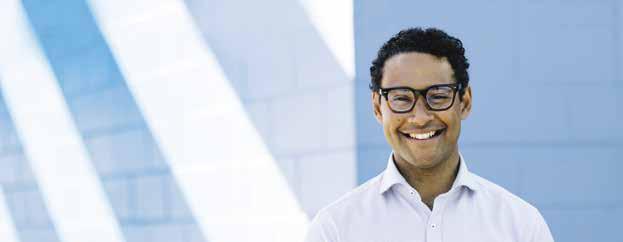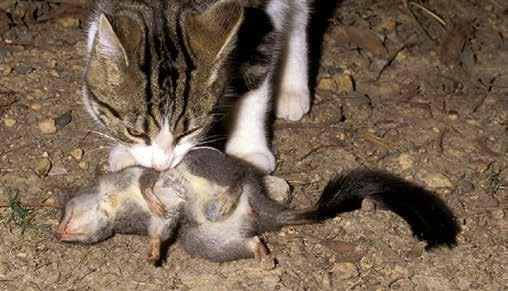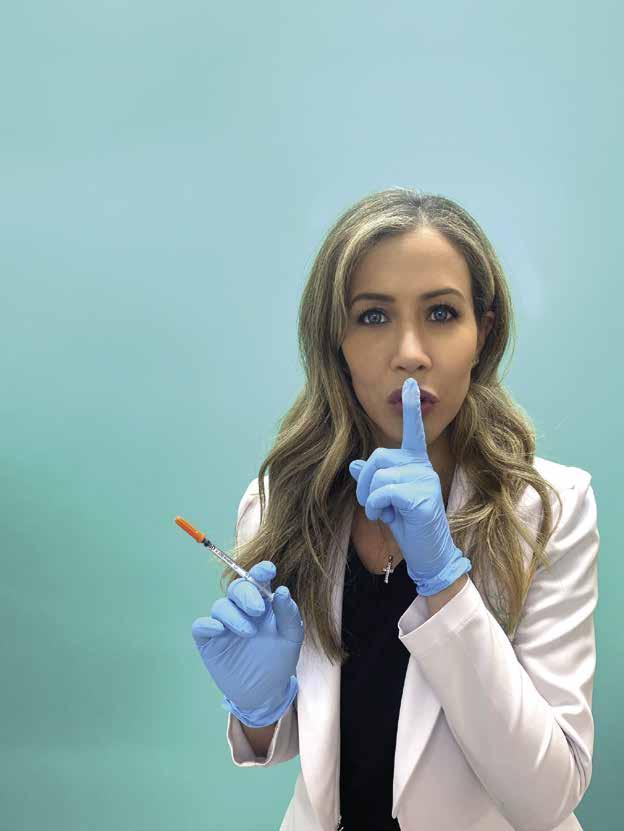
12 minute read
Headnoise 38 Kieran's Satire 40 Marjorie's Musings
Stay positive.
Pearls of Wisdom
Words Jeremy Ireland Photo Kay Nine
Who doesn’t love Pearl Bullivant? Her monthly column, full of guidance and wisdom, always provides a little nugget or two for me to take away and apply to my own world. Last month, Pearl provided a ‘pearler’ of a solution for dealing with those who may be inclined to ‘inflict discomfort onto others for the sake of their own personal ease’. Her recommendation was to think before we act - ‘look before you leap’ - by considering the potential outcomes of an action before doing it. It sounds simple enough, but there is an important link in the chain here that’s missing - feelings.
It’s the thinking, feeling, behaving triangle that constitutes the basic model of cognitive behaviour therapy (CBT), a model I have written about previously but is perhaps worthy of review in light of Pearl’s advice. The premise is that how we think directly impacts how we feel, which in turn impacts what we do. As Pearl says, it all starts with the thinking; if we are thinking a certain way (good, bad or indifferent) it will impact our emotional state or feelings, which then dictates what we do. This triangle works both ways; our behaviour (what we do) impacts how we feel, which in turn influences our thinking.
In Pearl’s kelpie example, you might think, ‘I had a kelpie as a kid, he was a good boy and lots of fun,’ then you start to feel excited and all gooey inside, then you behave by going out and buying the dog based on your thoughts and feelings. It’s the classic triangle - ‘think, feel, behave’ - with one leading to the other. Now, onto letting it run feral... you might think, ‘I’ve paid too much money to have this dog cooped up in the house’, you feel frustrated, possibly angry and a bit defeated, so you behave by taking him for a walk off leash so he can run around. It’s the same but different; what we think leads to how we feel, which then dictates our behaviour.
If this ‘think, feel, behave’ triangle is putting us into good territory, then happy days. But problems arise when we find ourselves feeling a certain way or doing something that has a negative impact on our mental state. In this case it is highly likely - almost probable - that there has been some kind of negative thought process preceding it that we weren’t even aware of. We call this ‘negative automatic thinking’ (NAT). Anxiety and depression are emotional states that rely on negative, if not distorted, thinking. It is the thinking that we must tackle if we are to improve our emotional state. Because this negative thinking is usually automatic, we are not even aware we have had the thought - we just feel a certain way - which in turn leads us to do something as a result. So what do we do about it?
Pearl talks about being ‘mindful’. Essentially, mindfulness is staying in the present, being in the moment and being self-aware. Being mindful can increase our awareness of how our minds fluctuate, often in unhelpful ways. Lifeline is big on mindfulness to keep people in the present to get them out of a crisis. If we find our minds wandering into the future, that is where anxiety lies. Anxiety is a future oriented emotion; we will often worry or fret about something that hasn’t happened yet. Distorted thinking can ruminate here, making the anxiety worse. With depression, we often find ourselves ruminating or brooding over past events, again often veiled with distorted or untrue thinking patterns, which in essence are cognitive distortions. One such distortion is ‘mind reading’, where you assume that you know what other people think without having sufficient evidence of their thoughts - ‘he thinks I’m a loser’, for example. There are many other types of cognitive distortions such as ‘discounting the positive’ (when we don’t take credit for the good things we’ve earned or achieved in our lives), ‘negative filters’ (when we filter out all of the good from a situation and are left with only a view of the bad) and ‘catastrophising’ (irrational thoughts where we believe something is far worse than it actually is), just to name a few.
I’ve never met Pearl, and don’t know if I ever will, but I am sure she has a big heart and knows how to ‘feel the feels’. Even Pearl would not be immune to some unhelpful ways of thinking if these feelings are getting her down or making her angry, or causing any other emotional state that might be affecting her wellbeing. I feel like I’ve poked the bear enough, time to put my leash on!
Have you got a question? You can get in touch with Jeremy by calling 0400 420 042.
Randwick News

It’s approaching that time of year when things start to feel a little lighter. The weather warms up, the sun comes out (hopefully!) and the community begins to spend more time outdoors. We’re lucky where we live – there’s plenty of beautiful beaches and green parklands to choose from. This year, one of my favourite local beaches is getting a bit of a makeover. We’ll be closing off McKeon Street in Maroubra to create more outdoor space for people to gather. The McKeon Street Plaza will be in place as a trial for six months, with entertainment and performers scheduled to bring more life and fun to the already popular beach front area. I hope you all get there to support the local businesses and enjoy the atmosphere. I certainly will! On another note, the Step Out Speak Out walk to raise awareness against domestic and family violence will take place on Friday 25 November. This is a very important issue and the more community that come out to support the walk, the stronger the message. Domestic and family violence will not be tolerated in our community and victims of domestic violence shouldn’t feel isolated or alone. This walk is a show of support and brings together numerous organisations from across our community. I hope to see you at High Cross Park in Randwick at 7am and we’ll walk together down Coogee Bay Road to Grant Reserve. Lastly, I’m really excited by Craig Shepherd’s work, which is on exhibition at the La Perouse Museum right now. Craig Shepherd is a local Aboriginal artist who was born and bred in La Perouse. His paintings bring alive the rich and layered past of this area, as seen through his mother’s eyes. He’s an amazing local talent. The exhibition is called “Living Stories” and will be on until early March.
Councillor Dylan Parker
Mayor of Randwick Randwick Mayor Dylan Parker
What’s On
OPENS FRIDAY 28 OCTOBER LIVING STORIES – AN EXHIBITION BY LA PEROUSE ARTIST, CRAIG SHEPHERD
Museum opening hours La Perouse Museum 1542 Anzac Parade La Perouse
SUNDAY 6 NOVEMBER BLAK MARKETS @ BARE ISLAND
10am – 3pm Bare Island Road La Perouse
THURSDAY 10 NOVEMBER TAI CHI: INTERMEDIATE LESSONS
11.30am – 12.30pm Online via zoom and in person at Lionel Bowen Library
THURSDAY 10 NOVEMBER RECIPE CLUB IN THE LIBRARY
1pm – 3pm Margaret Martin Library
SATURDAY 12 NOVEMBER TOUR OF THE RANDWICK RECYCLING CENTRE
8.45am – 2pm 72 Perry Street Matraville

Pure evil.
How to Tell Tara from Lara
Satire Kieran Blake, kieranblakewriter.org Photo Fi Lyne
It could happen to anyone. Your beloved cat disappears at the hands of a complete stranger after you entrust it to your local vet, and a desperate search reveals the existence of another tortoise-shell coloured cat with a very similar name. The horror!
So, how do you tell Tara from Lara? You could go back in time and demand that the stranger buys a black cat, and persuade them not to call it Lara.
Tara sounds like Lara. Tara looks like Lara, when scribbled by even the most loving hand.
But we can’t go back in time. If that were possible, we could train our beloved Tara to remain indoors. If so, our cute little kitty would not have escaped into the back garden and jumped the fence of the stranger’s home. She would not have survived on a diet of native Australian birds and animals that would enable her to remain at large for days, weeks, months or years.
For Tara can devour a species of native wildlife during her lifetime. She and her kin ensure that Australia has the highest rate of native mammal extinction in the world.
But, of course, we can’t go back in time, and this plan is far from foolproof. What if Lara isn’t house trained either and is free to roam day and night destroying wildlife? How would we ever tell them apart?
Instead, we must focus on getting Tara back safe and sound. Back into the loving arms of her distraught owners. For there is no more noble act in life than rescuing a pet.
How do we do this?
We could employ the intrepid investigative reporters at A Current Affair to scour the streets and conduct uncompromising interviews with everyone from concerned neighbours to the local barista. We could trust the same bastions of journalistic integrity to conduct a ruthless door stop at the veterinary clinic in a fearless attempt to uncover the truth, regardless of the risk to personal safety, and regardless of more pressing global issues vying for coverage. We have a cat to find.
We could lure Tara home with the familiar scent of a dressing gown, or we could import a truckload of native wildlife and let Tara chase and kill them all until she tires of this game and saunters home for cuddles and two square meals a day.
But even Multicare Stress Urinary Dry Cat Food won’t stop Tara from hunting the few remaining lorikeets and rosellas clinging to life in suburbia. And what if our local councils finally heed the call of our precious wildlife and impound Tara until a fine is paid?
Then just call her Lara.


The toothier the better.
Give the Watchdog Teeth
Words Dr Marjorie O’Neill, Member for Coogee
Democracy has been front and centre this year, with a federal election held in May and the buildup to the NSW state election in early 2023 already underway. One thing that has struck me in recent times is that while the significant majority of people involving themselves in politics at all levels are good and decent folks, keen to contribute and do the right thing, a small but not insignificant minority give the rest a bad name. One of the very unfortunate consequences of such actions is an erosion of public confidence in political processes and politicians, which ultimately undermines our democracy.
Politicians and those holding public office are simply not held in the high regard they once were a generation or two ago by the many people felt let down by the bad behaviour of a few in public office. Politics, which really should be the business of representing people and communities, was once considered a ‘noble profession’, and of course I believe it still is - or at least it is meant to be, it should be and it can be. But too often we feel let down by our elected class.
With the recent goings on at the NSW Independent Commission Against Corruption, including the appearance and resignation of a NSW Premier and the lack of accountability and commitment to a corruption watchdog at federal level, I am not in any doubt as to why people sometimes equate us politicians with other supposedly less esteemed professions.
It’s tempting for some in politics and the media to brush off less serious transgressions with the old ‘everyone makes mistakes’ and ‘they’re only human’ lines. While that can be true, the simple fact is when you have such great responsibility you must accept great scrutiny. As someone involved in politics, I accept that we are held to a higher standard of behaviour and we should be accountable for our actions.
The federal election earlier this year saw the issue of integrity in our political life assume a high profile. The choice was clear; the federal Labor team promised unequivocally to establish a federal ICAC, a genuine watchdog with sharp teeth, able to conduct open and transparent investigations into questionable conduct, and the Liberal-National coalition, which had failed time and time again to introduce a genuine watchdog and were instead proposing a body with virtually no powers to investigate politicians, carry out open investigations or apply any punishment other than the proverbial slap with a piece of wet lettuce. The peoples’ verdict was clear; a Labor federal government was elected and a National Anti-Corruption Commission Bill was introduced into federal parliament in the past month - a real win for democracy.
Here in our home state, I have the utmost faith in the ICAC and the job that it does in exposing dishonourable behaviour among our political class. ICAC has requested that its funding be independent of government, but this has been denied by the NSW Liberal government. Such a body is essential to ensuring integrity in our system and in fact ensuring that we have good people representing us. There’s nothing like a little transparency and accountability to encourage good behaviour and ensure those who believe in the ‘noble profession’ enter our public life. As your local representative in the east, I will always pledge to protect ICAC as an institution in NSW.
In Australia we generally enjoy the benefits associated with a healthy democracy and stable government, but this happy situation is not something we should take for granted. Our governments’ policies and the lifestyle we enjoy is very much dependent upon us exercising our democratic right to elect the political representatives and governments that we want to represent us. Enrolment and voting is compulsory for every Australian citizen aged 18 years or older and about 95 per cent of eligible voters are enrolled to vote at any election.
As at June this year, 97.1 per cent of eligible voters were enrolled, leaving about a half million people in Australia eligible but not enrolled to vote - that’s nearly 3 per cent of eligible voters not enrolled to vote. Then there is the half a million voters who intentionally record a big thumbs down by making a deliberate invalid donkey vote. Informal votes, where the ballot paper is not correctly filled but is not necessarily done deliberately, can account for around 5 per cent of votes cast - not ideal given how lucky we really are to have a free and democratic society, but hey, that’s democracy.
We have a strong ICAC in NSW and will soon have a similar anti-corruption commission federally. Please have confidence in our political processes and value the power you have to influence government policies. Enrol to vote and exercise your democratic right to secure the government policies you need to live your best life.






